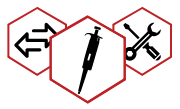Nexera-i MT Method Transfer System
 Method Transfer provides easy, seamless method migration in one instrument
Method Transfer provides easy, seamless method migration in one instrument
Transferring methods between HPLC and UHPLC can be tedious and time consuming. The Nexera-i MT makes easy work of the task. Built on the highly successful i-Series LC, the MT has a touch-screen LCD display for easy, intuitive system control and chromatogram viewing, built-in degassing, quaternary solvent delivery, autosampler and a UV or PDA detector.
As with any i-Series LC, sample injections are the fastest around (< 14 seconds), with ultra-low carryover. Column switching (HPLC / UHPLC) is built in.
![]()
- Built-in column switching (HPLC/UHPLC) with independent, optimized flow paths
- Sample Pretreatment – automate sample dilution and reagent/internal standard addition
- Optional Add-on Detectors – add a refractive index or fluorescence detector
- Wide linear dynamic range and repeatability for small injection volumes down to 0.1 µL
Fully Unattended Operation from Startup to Shutdown
Nexera can be set to start up at a specified time, so that it can complete auto-purge, equilibration and baseline checks in advance, and be ready for analysis as soon as you arrive at the lab. Moreover, the system can be set up in advance to run without user intervention all the way from start up through analysis to shutdown.
You can view the status and predicted analysis completion time for multiple systems from any location via a smart device. None of these features requires any special software.
Auto-Diagnostics and Recovery
In rare cases, air bubbles can form in the mobile phase and cause problems if inhaled into the pump. Nexera has the ability to monitor baseline changes and pressure fluctuations to check for abnormalities.
When it detects an unusual fluctuation, it can automatically pause the analysis, purge the flow path, and restart analysis once it has confirmed recovery to normal pressure.
FlowPilot Protects Columns
HPLC columns can be damaged by sudden pump starts and stops or extreme gradient changes. The Nexera automatically uses FlowPilot (Smart Flow Control) to increase the flow rate gradually to the set point. There is no need to create startup protocols for each analysis.
(Pat. Pending)
Mobile Phase Levels Measured in Real Time
Reservoir tray weight sensors (optional) can be used to monitor the volume of mobile phase or autosampler rinse solution in up to twelve containers. The containers can also be checked remotely from a smart device.
You will no longer need to worry about running out of mobile phase mid-analysis, because the device will notify you before starting the run if the volume remaining is too low.
(Pat. Pending)
Space-Saving Design
The Nexera frees up bench space with a compact design two thirds the size of Shimadzu's previous model.
Energy-Saving Standby Mode
The Nexera uses over 70% less electricity when in standby mode, significantly reducing running costs and supporting an environmentally-friendly lab.
Easy-to-use Touch Panel
The touch panel screen and LabSolutions control screen display are uniform for easier operation.
Dual Injection Enables Simultaneous Analysis
Injection ports for two separate flow paths can be installed, allowing two different types of analysis (such as analysis of amino acids, organic acids or vitamins) to be performed using one system.
Ultra-low Carryover
The Nexera boasts ultra-low carryover, even on a high-sensitivity LC/MS/MS. This reduces time spent on rinsing, resulting in a shorter overall analysis time.
Add Samples Mid-Analysis
The autosampler allows the insertion of additional vials and MTPs even during analysis. The sample rack structure controls air flow inside the autosampler to maintain the internal temperature and prevent condensation.
High-Sensitivity Impurity Analysis
The SPD-M40 detector achieves an extremely high level of sensitivity and linearity (up to 2.5 AU). This allows quantitation of very lowconcentration impurities even in high-concentration samples. The UV cut-off filter installed in the detector prevents sample degradation due to UV light, helping to maintain good linearity at low concentrations.
Stable Baseline
Baseline fluctuations can affect peak area calculation, reducing the accuracy of quantitative results. The SPD-M40 photodiode array detector’s “Advanced TC-Optics” function adjusts the temperature of the flow cell, lamp, and optical system to lessen the impact of external temperature changes. Noise and drift have also been reduced by 40% compared to the previous model.
(Pat. Pending)
Analysis Cycle Time Less Than 10 Seconds
The SIL-40 autosampler can inject samples in as little as 5 seconds, twice as fast as the previous model. In addition, continuous analysis can be carried out on up to 44 MTPs (using 3 PLATE CHANGERS). Together these features dramatically increase analysis throughput. 8 injections can be completed within 1 minute (caffeine).
Pharmacokinetic analysis requires not only speed but also high reliability at low concentrations. With its ultra-fast injection and ultra-low carryover, the SIL-40 autosampler delivers high reproducibility and reliability, even during an ultra-fast 30-second analysis.
Automated Analysis of Thousands of Samples
Non-stop temperature-controlled analysis of thousands of samples is now possible with the SIL-40's optional plate changers. Set all your samples in advance with up to 14 MTPs or vial racks in each PLATE CHANGER. The autosampler's excellent temperature control also allows the insertion of additional vials and MTPs during analysis.
Quick and Reliable Mobile Phase Blending
The Nexera can automatically blend mobile phases at any set ratio. This speeds up the preparation of buffer solutions and the dilution of solvents, and can be used to easily prepare the exact amounts required for analysis, reducing waste as well as labour.
Simplified Method Development
The Nexera Method Scouting System is capable of automatically switching between combinations of up to 6 columns and 8 mobile phases. It can run unattended, maximizing available uptime. In addition, Method Scouting Solution Software can automatically create methods with different columns, mobile phases, and gradient conditions from a single base method.
